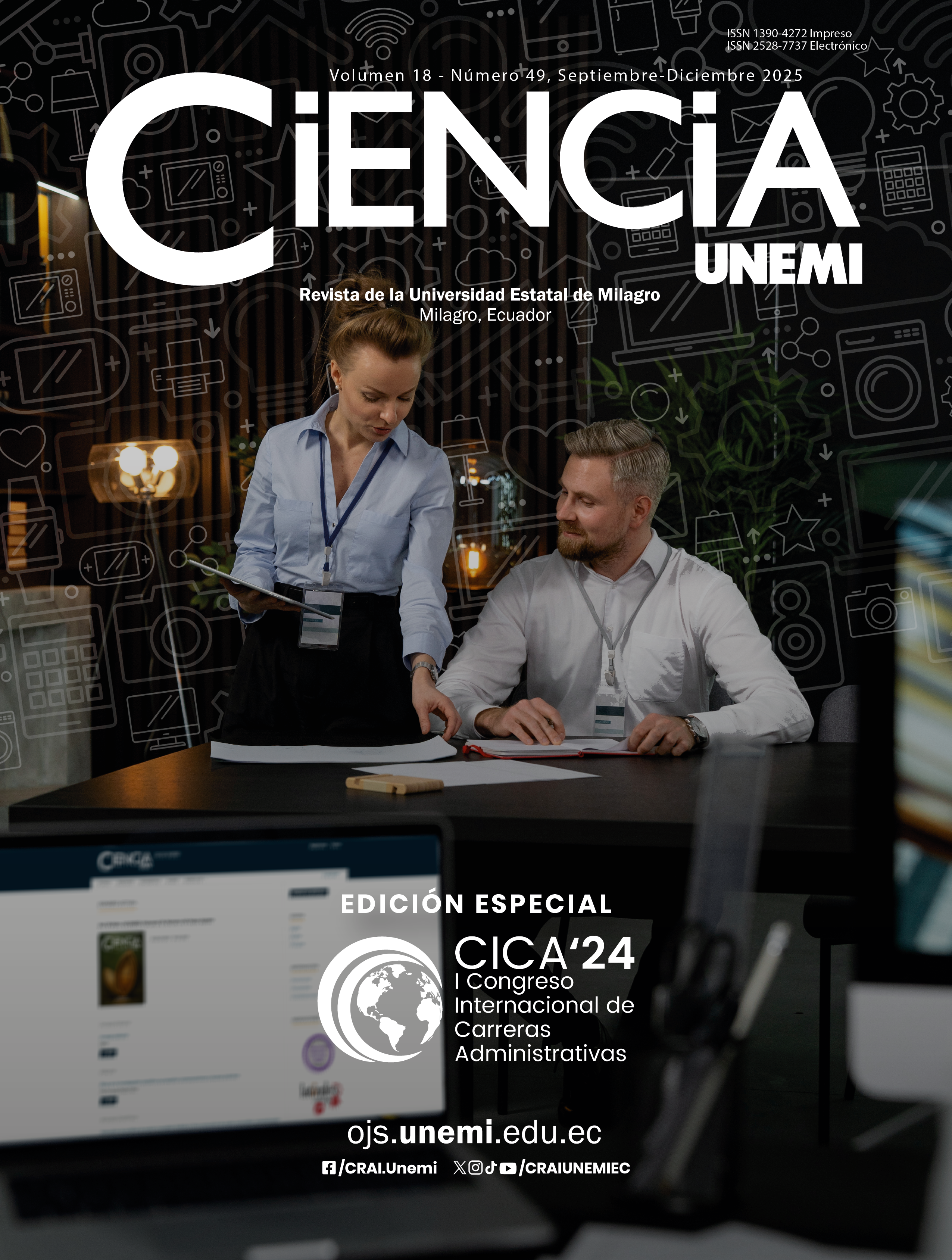Gamification and Organizational Justice: a business approach
DOI:
https://doi.org/10.29076/issn.2528-7737vol18iss49.2025pp61-70pKeywords:
Justice, dynamics, self-learning, benefit, SkillsAbstract
Gamification seeks to foster innovative and engaging responses through the use of game-based strategies, enabling participants to progressively develop their skills and self-directed learning. In parallel, organizational justice aims to establish fair work environments where employees are rewarded, motivated, integrated, and valued according to their contributions, free from bias and arbitrariness.
This study aims to evaluate whether the implementation of gamification enhances the management of organizational justice by integrating its core components (dynamics, mechanics, and elements) with Colquitt's four-factor model of Organizational Justice (M4). A quasi-experimental design with a quantitative approach under a positivist paradigm was employed. The study was validated through expert judgment using Aiken’s V coefficient (0.93) and demonstrated strong reliability through Cronbach’s Alpha (0.86).
Data were collected using a 20-item questionnaire administered to 49 Business Administration students at the Technical University of Ambato, who participated in five structured gamified activities designed to reflect the four dimensions of organizational justice. The findings support the applicability of gamification as a strategic tool to promote organizational justice and offer valuable insights for future research and practical interventions in similar contexts
Downloads
References
Batista, E. (23 de Septiembre de 2023). La Justicia Organizacional y su Impacto en el Bienestar de los Empleados. Linkedin. https://www.linkedin.com/pulse/la-justicia-organizacional-y-su-impacto-en-el-de-los-edwin-y-/?originalSubdomain=es
Bies, & Moag. (1986). Interactional justice: Communication- criteria for fairness (Vols. (Vol. 1, pp. 43-55)). Research on Negotiation in Organizations. Obtenido de https://www.scirp.org/reference/ReferencesPapers?ReferenceID=1482603
Campuzano, N., & Suárez, A. (2018). Incidencia del clima organizacional en el desempeño laboral, el servicio al cliente: Corporación de Telecomunicaciones del Cantón La Libertad. Ecuador: Universidad Estatal Península de Santa Elena. República del Ecuador. Obtenido de http://scielo.sld.cu/scielo.php?script=sci_arttext&pid=S2218-36202018000100180
Colquitt, J. (2001). On the dimensionality of organizational justice: A construct validation of a measure. Journal of Applied Psychology, 86(3), 386–400. https://psycnet.apa.org/doi/10.1037/0021-9010.86.3.386
Cropanzano, R., Bowen, D., & Gilliland, S. (2007). The Management of Organizational Justice (Vol. 21). Academy of Management Perspectives. https://doi.org/10.5465/amp.2007.27895338
Fierro, L. (2016). Justicia Organizacional en una institución privada de educación superior. Santiago: Economía y Negocios Universidad de Chile. https://repositorio.uchile.cl/handle/2250/140909
Greenberg, J. (1990). Employee theft as a reaction to underpayment inequity: The hidden cost of pay cuts. (Vol. 75). Journal of Applied Psychology. https://doi.org/10.1037/0021-9010.75.5.561
Guerrero, C., Infante, R., & Mejía. (2023). Bibliometric Analysis Based on Scientific Mapping in the Use of Digital Marketing Strategies (Scopus ed.). (Scopus, Ed.) Ecuador: Elsevier B.V. http://dx.doi.org/10.1007/978-3-031-45682-4_18
Guerrero-Velástegui, CA., Silva-Arcos, P., Infante-Paredes, R., Ballesteros-López, L. (2024). Gamification as an Essential Factor for Developing Management Skills. In: Auer, M.E., Cukierman, U.R., Vendrell Vidal, E., Tovar Caro, E. (eds) Towards a Hybrid, Flexible and Socially Engaged Higher Education. ICL 2023. Lecture Notes in Networks and Systems, vol 900. Springer, Cham. https://doi.org/10.1007/978-3-031-52667-1_5
Hildebrandt, H. (23 de Marzo de 2023). www.linkedin.com. Obtenido de www.linkedin.com: https://www.linkedin.com/pulse/el-poder-del-juego-desatando-potencial-de-la-en-%C3%A1rea-hernan/?originalSubdomain=es
Huertas, L. (2021). GAMIFICACIÓN: ¿NUEVATENDENCIA EN LOS PROCESOS DE GESTIÓN DE RECURSOS HUMANOS? Perú: Innova. https://repositorio.pucp.edu.pe/index/handle/123456789/185155
Infante, R., Mayorga, & Guerrero, C. (2024). Gamification Influences on Students’ Motivation in the EFL Classroom. (Scopus, Ed.) Ecuador: Elsevier B.V. https://www.researchgate.net/profile/Cesar-Andres-Guerrero-Velastegui/publication/390042228_Gamification_and_Organizational_Justice_A_Business_Approach/links/67e54b7b43ec6369e201ea2e/Gamification-and-Organizational-Justice-A-Business-Approach.pdf?origin=scientificContributions
Juca, J., & Robles, R. (2017). Factores determinantes de la Justicia Organizacional y satisfacción laboral en servidores públicos. Milagro: Universidad Estatal de Milagro. Obtenido de https://uctunexpo.autanabooks.com/index.php/uct/article/view/237/356
Khuram, H., & Shahid, N. (2014). Integrating Principles of Care, Compassion and Justice in Organizations: Exploring Dynamic Nature of Organizational Justice (Vol. 20). Journal of Human Values. http://dx.doi.org/10.1177/0971685814539411
Leventhal, G. (1976). What Should Be Done with Equity Theory? New Approaches to the Study of Fairness in Social Relationships. New Jersey: Contemporary topics in social psychology. https://scispace.com/pdf/what-should-be-done-with-equity-theory-new-approaches-to-the-57k7iropom.pdf
Mladinic, A., & Isla, P. (2002). Justicia Organizacional: Entendiendo la Equidad en las Organizaciones. Psykhe, 11(2). Recuperado a partir de https://revistachilenadederecho.uc.cl/index.php/psykhe/article/view/20143 Newman, J., Milkovich, G., & Gerhart, B. (2005). Compensation. (M.-H. Education, Ed.) Chicago: McGraw-Hill Education.
Pérez, J., Flores, R., & Martínez, E. (2013). Validez y confiabilidad de la escala de justicia organizacional de Niehoff y Moorman en población mexicana (Vol. 59). México: Facultad de Psicología, Universidad Nacional Autónoma de México. Obtenido de https://www.scielo.org.mx/scielo.php?script=sci_arttext&pid=S0186-10422014000200005
Ríos, J., & Loli, A. (2019). Justicia Organizacional y Compromiso Organizacional en trabajadores del sector minero en Perú. Perú: Revista de Investigación en Psicología. https://revistasinvestigacion.unmsm.edu.pe/index.php/psico/article/view/16586
Ríos, L., & Carranza, G. (2018). Determinantes de explicación del constructo justicia organizacional y su impacto con satisfacción y desempeño laborales. Guadalajara. https://doi.org/10.20983/novarua.2018.17.3
Riquelme, C. (15 de Diciembre de 2023). Gamificación empresarial como herramienta dinámica de motivación y logro de objetivos. (C. K. Chung., Ed.) SciELO Analytics, 5. https://www.redalyc.org/journal/7497/749778814010/html/
Sjöberg, O., Oyarzún, F., Ganga, F., & Cadamuro, I. (2023). Justicia Organizacional y resultados empresariales. Estudio comparativo en pequeñas y medianas empresas de Chile y Perú. Print version ISSN 1692-6013On-line version ISSN 2500-8692. https://doi.org/10.14718/NovumJus.2022.16.3.12
Werbach, K., & Hunter, D. (2012). For the Win: How Game Thinking can Revolutionize your Business. Estados Unidos: Harrisburg: Wharton Digital Press. Obtenido de https://www.google.com.ec/books/edition/For_the_Win/aL2tzgEACAAJ?hl=es
Zambrano, A., & Luque, K. (2020). La Gamificación: herramientas innovadoras para promover el aprendizaje autorregulado. Chone, Ecuador: dominiodelasciencias. https://dominiodelasciencias.com/ojs/index.php/es/article/view/1402
Zambrano, P. (2019). Justicia Organizacional y su Incidencia en la Satisfacción Laboral del Personal de las Instituciones Públicas del Cantón Bolívar. Ecuador. https://doi.org/10.31095/investigatio.2020.13.1
Downloads
Published
Issue
Section
License
Copyright (c) 2025 CIENCIA UNEMI

This work is licensed under a Creative Commons Attribution-NonCommercial-NoDerivatives 4.0 International License.
Authors can keep the copyright, granting the journal right of first publication. Alternatively, authors can transfer copyright to the journal, which allow authors non-commercial use of the work, including the right to place it in a file open access.
















